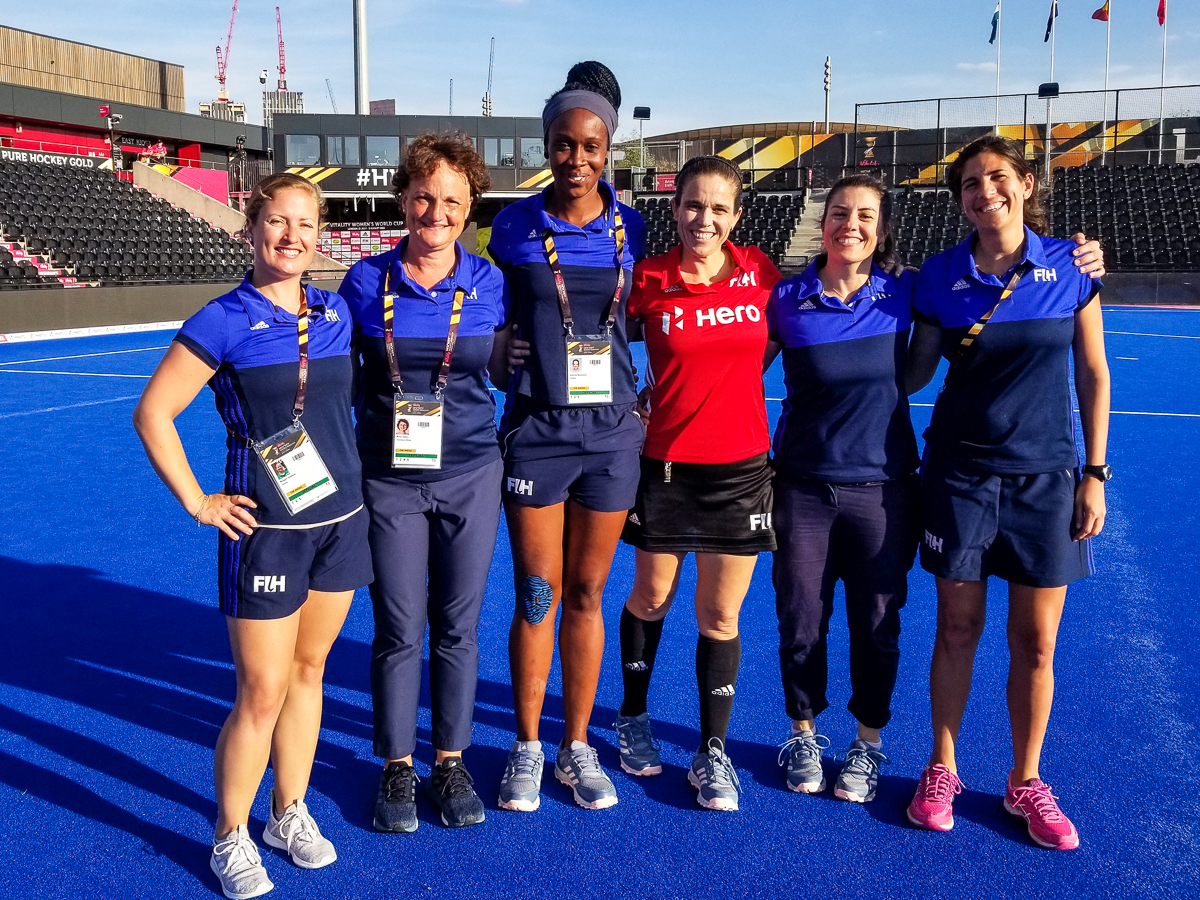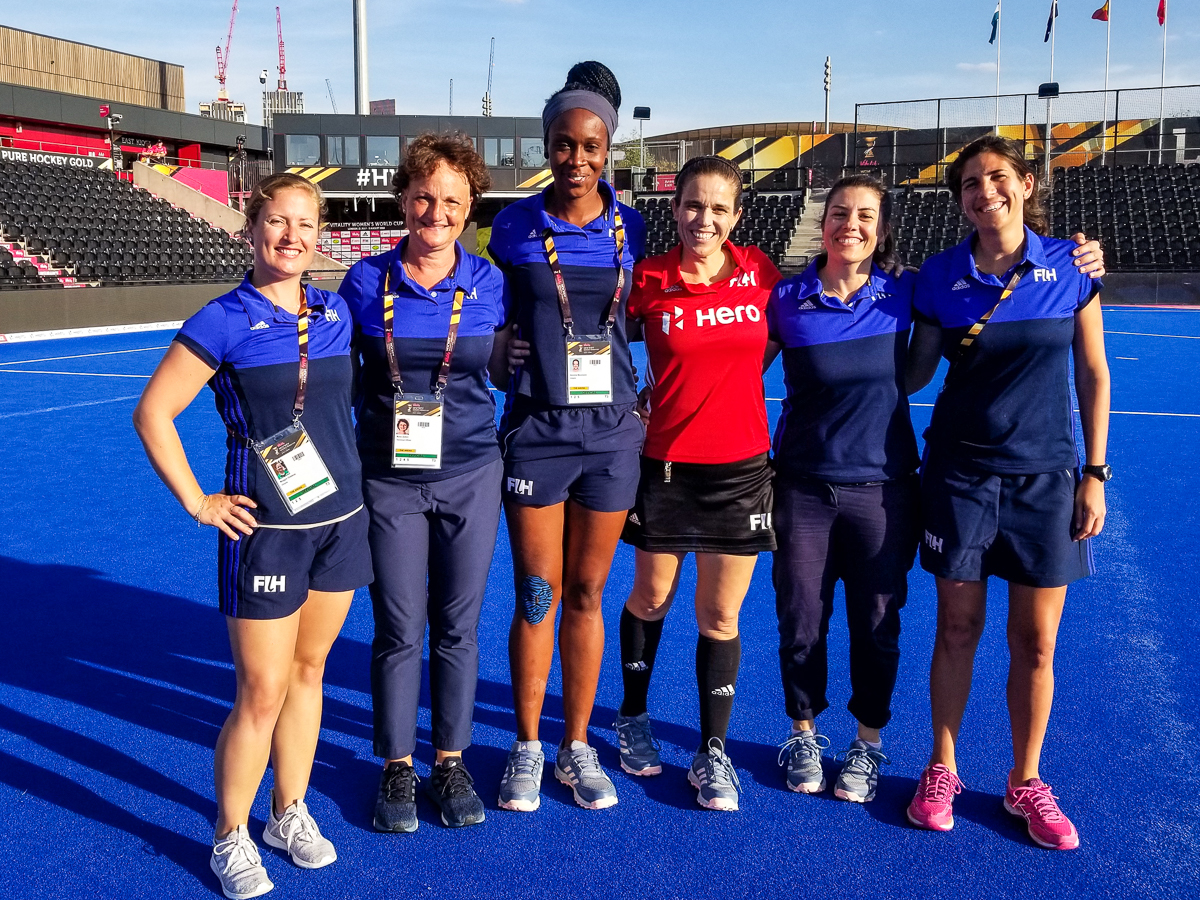
The Pan American Hockey Federation presence at the Vitality Hockey Women's World Cup in London was spearheaded by two groups who had very good reason to be viewing the event with huge anticipation. Las Leonas have been building their team since a below par performance at the 2016 Rio Olympic Games and head coach Agustin Corradini would have been looking for a good showing from this team. A medal was definitely a realistic aim for the team ranked at number three in the world.
Also heading to London with their hopes high was USA. Ranked seventh in the world, with a Hockey World League Semi-Final title to their name, the USA were hoping to emulate or better their best ever World Cup performance – a bronze in 1994.
In the event, neither side did itself justice. USA seemed to be strangled by their own ambitions, playing with little of the attacking, aggressive and confident attitude that they have brought to previous performances. Argentina too, approached each game in their usual intense and passionate manner but just failed to deliver. That said, the Argentina team were part of one of the best international hockey matches that has been seen recently in their 3-2 loss to Germany in the pool round. Yes, a loss, but when they look back, the team cannot fail to recognise that they played their part in a great advertisement for the exhilaration and skill that women's team sports can provide.
At the end of the pool rounds, USA had failed to make the quarter finals as they finished at the bottom of a group. Instead, Pool B was topped by the most unlikely of competitors, Ireland, who had come to London as the second lowest ranked team in the competition. USA's failure to beat Ireland, India or England meant they didn't get a second shot at the glory they experienced in the Hague four years earlier, where they performed their own underdog heroics. Speaking after the game a disappointed Janneke Schopman said there were many things to be looked at throughout the USA's performances in London, including her own approach. A devastated Melissa Gonzalez, who might just have played her final major international for her country said: "It just didn't happen for us this time. We couldn't have worked any harder or put any more effort in, but something just didn't click. It wasn't to be our time."
Argentina made it through the pool stages, finishing second in their group. which meant an encounter with New Zealand in the cross-over matches. Las Leonas sent the Black Sticks home early, winning that match easily. The result set up an encounter with Pool D winners Australia.
Neutral observers would probably have favoured Argentina in the contest. They had endured tougher matches in the pool stages and so were already battle-hardened. Australia had looked okay without looking menacing in their pool games. At the national anthem, Argentina's goalkeeper Belen Succi was just one of a number of players singing with raw emotion and the tears coursed down her face as she gathered her helmet and headed for the goal.
The hundreds of Leonas' fans in the crowd turned London into Buenos Aires for the next 60 minutes but their side could not break down the Hockeyroos defence. As the game went to sudden death, one Argentinian journalist turned to another and muttered "We are no good at shoot-out." And so it proved.
Australia's goal-keeper Rachael Lynch was in great form and her field players were able to hold their nerve to take the win and break Argentina's hearts.
And so the PAHF representatives left standing at the end of the quarter finals were to be found wearing the electric blue of the 'third team'. On the technical bench, two of the six technical officers – responsible for the smooth running of the event, including all the minute-by-minute statistics and assessing the action on the pitch– were Lorena Rinaldini from Argentina and Rene Zelkin from USA.
Of the 15 umpires, four hailed from PAHF national associations: Carolina de la Fuente (Argentina), Irene Presenqui (Argentina), Ayanna McClean (Trinidad and Tobago)and Maggie Giddens (USA).
We spoke to two of the third team as they reflected back on an amazing experience that has to be one of the highlights of a hockey umpire's career.
For Maggie Giddens, the 2018 Vitality Hockey Women's World Cup will always hold a special place in her memories as she umpired her 100th senior international at the event, thus earning the coveted Golden Whistle. "The first highlight that comes to mind straight away is walking to the venue for the first day of matches," says the vivacious American. "Seeing the crowd queuing to get into the venue and the stands starting to fill is a moment I'll never forget. In that moment it became very real that the World Cup is here and how much of an honor it was to be a part of it, the chills I felt in that moment were unreal.”
"The other, obvious highlight I have to mention is receiving my Golden Whistle. Umpiring 100 international matches is exciting in itself but to be with my colleagues at a World Cup to celebrate was magical. I've known most of the other umpires since 2009 or 2010 and their friendships mean the world to me. Tournaments would not be the same without the awesome people involved so to reflect on 100 matches with some of my favorite umpires is something I will never forget.”
"The third team had a great tournament and I am thankful and grateful to have been a part of it. We were a close group who celebrated each other and our performances. Every umpire wants to be on the pitch but at an event at this level it is important to have a beginner's mind and take every opportunity to learn from your colleagues and study the game and the teams. Gaining experience and taking everything in will prepare all of us for the next big one, go Third Team!”
When it comes to team work, the officials had it nailed at this World Cup. Walking into the hotel the officials were staying at and you would encounter groups of umpires laughing and chatting over a coffee; group fitness sessions were fun as well as challenging; the use of video clips to help develop umpiring skills was well-received; and there was even a smashing of all cultural barriers when the officials took part in a spontaneous cricket match. McClean's laughter as she describes Gidden's initial bemusement at the complex game is infectious. This was the World Cup when the officials took centre stage… in a very good way.
Of course, for any tournament to work, the optimum conditions for athletes and officials has to be in place and for Ayanna McClean, the organisers in London had it nailed. "The organization team for the tournament was excellent. They went above and beyond. Prior to the event, we got all the information we needed in a timely fashion and during the event, they were on top of everything including any last minute requests. England Hockey were great hosts and the "Hockey Makers" (the army of volunteers who worked at the event) truly added another level of professionalism to the event. Always friendly, always helpful and they brought a great atmosphere to the occasion.”
"The presentation of the sport was also far above any I have ever experienced in my career. This being my first World Cup I was excited to see and be a part of the highest level of hockey. The presentation of the game as a world class show was definitely displayed. BT Sports and their crew put on a great showing from the television side of things."
Of course, all the organisation is the world would not have made the event a success of the hockey had not been up to scratch, but as McClean points out: "the hockey itself was quite spectacular. It was truly a tournament of the underdogs."
Ireland and Spain making it to the semi-finals, alongside hockey powerhouses Australia and Netherlands, added a whole new dimension to the World Cup and for McClean, this is a sign that the sport is really growing. However, like so many people, the dominating team remains the Netherlands, and as the Trinidad and Tobago umpire says: "The Dutch provided a magnificent showcase of hockey."
The 2018 World Cup really did have it all. There was the heartbreak of early exits, the drama of the shoot out, the pressure of the cross-over matches, the excitement of a full stadium. And ask any of the players at the end of this two week hockey spectacular and they might just reply that the third team also put in a quite magnificent performance.

